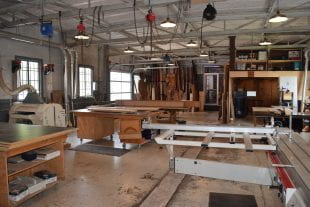NEWS RELEASE
Amy McCaig
713-348-6777
amym@rice.edu
Small manufacturers in Houston struggling to find workers, according to new Rice report
HOUSTON – (Nov. 21, 2019) – Small urban manufacturers in Houston are having a hard time recruiting qualified workers, according to a new report that provides rare insights into an often overlooked segment of the city’s economy.
These small businesses contributed $33 million to the city’s Houston’s total manufacturing sales volume in 2018, but many of the businesses’ owners — 41% — said finding qualified workers is a struggle, according to the report from Rice University’s Kinder Institute for Urban Research.
“The Maker Economy: The Growing Demand of Small Urban Manufacturers in Houston,” examines survey data collected directly from 69 small urban manufacturers, artists and makers operating in the Greater Houston region. It was commissioned by TX/RX Labs through funding from Houston Local Initiatives Support Corporation (LISC).
The purpose of the study, conducted by Kinder Institute researchers Carlos Villegas, Chris Servidio and Allison Yelvington, was to address a general lack of information about the industry — a glaring gap as TX/RX Labs and Urban Partnerships Community Development Corporation (UP CDC) move forward with groundbreaking on the new East End Maker Hub.
Besides quantifying the economic contributions of small urban manufacturers and their struggle to find skilled laborers, the researchers uncovered a number of other important findings. Of the businesses surveyed, 60% were owned by men and 82% were owned by non-Hispanic whites, a number strikingly out of step with Houston’s ethnically diverse population.
“Although the manufacturing sector has evolved over the last few decades, it is unique in that it has a low barrier to entry,” Servidio said. “Anyone can learn vital skills through on-the-job training, apprenticeships or even just tinkering on their own. It’s also a creative industry, one that rewards dedicated hard work and allows people to be more deliberate in their day-to-day (operations). All that being said, it was surprising to us that the businesses surveyed did not mirror Houston’s diversity.”
Nearly half of the survey respondents also reported that finding appropriately sized, affordable industrial space was a struggle — and they said that represented the No. 1 inhibitor of their growth. Forty-five percent said they struggled to find sufficient capital to scale their operations, with some relying on commercial bank loans or even contributions from family and friends. One-third expressed desire to expand within and beyond Houston but found it difficult to do so without external support for marketing and branding, and one-third expressed the need for improved access to proper equipment to grow their businesses.
“Above all, capital and space seemed to be the most pressing challenges faced by small manufacturers in Houston — these aren’t unique challenges, any small business faces these challenges,” Villegas said. “What is distinctive about the experience of small manufacturers in Houston is that they are stuck and can’t scale their business. Even with a growing customer portfolio there are challenges to hire an additional worker, purchase additional machinery, and regulations preventing them from bolstering their space to keep up with demand. As the city continues to grow and neighborhoods change, it’s pertinent to take stock of what already exists here in Houston and ensure all local businesses have the opportunity to grow and thrive with the resources they need and without the risk of displacement.”
These challenges are not insurmountable, the researchers said. Other regions have found distinctive ways to address similar challenges to support their growing urban manufacturing networks. Investments in manufacturing and infrastructure (an industrial corridor model) have provided unique approaches to neighborhood revitalization in other cities.
“A similar approach could be used here in Houston,” Servidio said. “And with the imminent groundbreaking of Urban Partnership CDC’s East End Maker Hub, the future home to an expanded TX/RX Labs and other clients, this is a pivotal moment.”
The survey for the study was conducted between April and August 2019. The findings were supplemented by one-on-one conversations with a selected group of small manufacturers operating in neighborhoods directly adjacent to downtown.
The researchers hope the report will help implement strategies to ensure small urban manufacturers can scale their businesses locally.
The full study is available online at https://scholarship.rice.edu/bitstream/handle/1911/107623/KI Research Report-Small Urban Manufacturing 8.pdf. It was funded by Houston LISC with technical support from TX/RX Labs.
-30-
This news release can be found online at news.rice.edu.
Follow Rice News and Media Relations via Twitter @RiceUNews.
Kinder Institute website: https://kinder.rice.edu/
Located on a 300-acre forested campus in Houston, Rice University is consistently ranked among the nation’s top 20 universities by U.S. News & World Report. Rice has highly respected schools of Architecture, Business, Continuing Studies, Engineering, Humanities, Music, Natural Sciences and Social Sciences and is home to the Baker Institute for Public Policy. With 3,962 undergraduates and 3,027 graduate students, Rice’s undergraduate student-to-faculty ratio is just under 6-to-1. Its residential college system builds close-knit communities and lifelong friendships, just one reason why Rice is ranked No. 1 for lots of race/class interaction and No. 4 for quality of life by the Princeton Review. Rice is also rated as a best value among private universities by Kiplinger’s Personal Finance.


